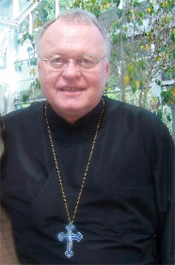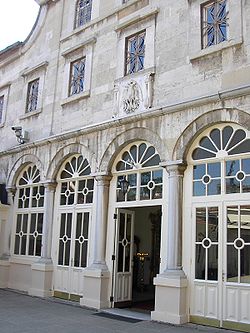SOURCE: orthodoxytoday.org
By George Matsoukas
 Fr. Peter Gillquist
Fr. Peter Gillquist
The 18 Evangelical Orthodox Christians at the Pentecost services, the first kneeling service they witnessed, included their top leadership: Father Peter Gillquist the presiding leader, Father Gordon Walker, leader of the members of the movement from the East and Father Richard Ballew, the leader of the members from the western part of the USA. Representing the Greek Orthodox Archdiocese was Father Gregory C. Wingenbach, presently serving in Missoula, MT, assigned to accompany the group - only hours before those from the east coast were to depart from Kennedy Airport, NYC. He replaced then Bishop (now Metropolitan) Maximos of Pittsburgh, who arranged for the delegation to meet with the Ecumenical Patriarch and the Synod, and who supported and guided their journey to Orthodoxy. Dr. Apostolos Athanasakes, Chairman of the Department of Classics, University of California at Santa Barbara, was also part of the delegation and served as the guide to the group. The Secretary to Ecumenical Patriarch Demetrios, Metropolitan Bartholomew, the present Patriarch, when pressed by the group, told them after the service that the Patriarch and Holy Synod were glad they were on a pilgrimage to the Holy Mother Church but they could not meet with the Patriarch. This interaction took less than two minutes.
The members of the delegation left their first Pentecost service in the Orthodox Church upset, depressed and disturbed. Dr. Athanasakes suggested later that afternoon that they write a letter of appeal to the Patriarch and the Holy Synod which they did. Dr. Athanasakes personally circulated the letter to selected members of the Holy Synod whom he knew. The results were that a meeting was set up with Fathers Peter Gillquist, Walker, Ballew and Metropolitans Bartholomew and Maximos of the Holy Synod attending. This meeting was held two days after Pentecost and lasted about one hour. Gifts were presented to the Patriarchate from all the Orthodox Evangelical missions including homemade quilts, blueberry jam and an appropriate monetary gift for the Patriarchal orphanage. Also, photographs of the missions were presented to the Metropolitans. The meeting concluded withinstructions from Metropolitan Bartholomew for the group to go home and continue their dialogue with Archbishop Iakovos. They left Istanbul without meeting with the Patriarch.
Return Home Via Boston and a Meeting at Holy Cross Seminary
From Istanbul they journeyed to Thessalonica Greece to the Monastery of Vatopedia where tradition holds that St. Paul preached his first lesson to the people of Thessalonica. The altar of the chapel in the monastery is built on the stone where St. Paul stood to preach his lesson. Two days later, they returned home via Boston. There, they attended the World Council of Churches meeting on “Baptism, Communion and Ministry.” Their attendance at this meeting had been scheduled as part of the visit to the Phanar. Bishop Maximos of Pittsburgh had made these arrangements. For the first time, the Evangelical Orthodox Christians journeying to canonical Orthodoxy met Orthodox Bishops from all over the world, including Coptic Bishops. The World Council of Churches sponsored and paid the passage for many of the bishops to attend the meeting that brought all these leaders together to help them begin to think about Unifying Orthodoxy World–Wide. Whom did they meet at this meeting? None other than Metropolitan Bartholomew, the present Ecumenical Patriarch, who was surprised to see them there and wondered why they were there.
The delegation pressed to meet with Archbishop Iakovos, of Blessed Memory, to learn why they had not been received by the Patriarch. Finally, they met in a small conference room in the main seminary building. The meeting was short. He told them that he was glad they had made their pilgrimage to the center of Orthodoxy. Father Gordon Walker asked how they could continue their dialogue with him as they had been instructed in Istanbul by Metropolitan Bartholomew. Archbishop Iakovos replied: “Don’t call us, we’ll call you.”
Why the Evangelical Orthodox Christians Were Refused a Meeting with the Patriarch and Why They Were Not Welcomed into The Greek Orthodox Archdiocese
As Father Peter Gillquist was departing a day earlier to travel to Istanbul on May 29, 1985 because of an airline strike, Archbishop Iakovos was sending Fr. Peter a telegram, which he did not receive until his return home. The telegram stated that the delegation should not travel to Istanbul. The east coast members of the delegation left a day later from Kennedy Airport and learned on their arrival at the Airport that Bishop Maximos of Pittsburgh had been replaced by Father Gregory C. Wingenbach as the representative of the Greek Orthodox Archdiocese to accompany them to Istanbul.
What caused these sudden changes in the plans that had been made over months and years? At the end of May 1985 (within the week of the planned departure of the Evangelical Orthodox), the Ambassador of Greece to the United Nations flew to New York for the day to meet with Archbishop Iakovos to inform him that the Greek government did not want a large group of Americans to be taken into the Greek Orthodox Church. Such a conversion would weaken the ties between the Greek nation and the Archdiocese. Bishop Maximos was summoned to New York and was asked to be part of the meeting between the Archbishop and the Greek Ambassador to the United Nations. Bishop Maximos was stunned and asked how could a government could dictate the Church’s decisions in such matters?
Conclusion
 Church of St George in the Fener
Church of St George in the Fener
We pray that Patriarch Bartholomew revisits these actions and decisions and exercises his ecumenical responsibilities by convening a Great and Holy Council of the Orthodox Churches and also includes the Oriental Orthodox Churches. The all too many unfortunate decisions and actions of the Ecumenical Patriarchate, as exemplified by the decision in 1985 not to receive the Evangelical Orthodox, have weakened the Greek Orthodox Archdiocese of America so that today it is in a dormant and no growth situation, barely able to replace its numbers.
On the other hand the Antiochian Orthodox Christian Archdiocese has flourished as a vibrant Church, doubling the number of its members in recent years. The influence of those Christian pilgrims seeking the truth of Orthodoxy, who in 1985 were excluded from the Orthodox Church by the Ecumenical Patriarchate and later were accepted and “welcomed home’ by the Orthodox Church of Antioch, has resulted in blessed and wonderful consequences for Orthodoxy. They have enabled the faith to be projected to our neighbors who live in our land and with Apostolic (missionary) zeal are embarked on the Holy Mission to bring America to Orthodoxy. They have been catalysts for the renewal of Orthodoxy in America. And without distinction among races, cultures, people or nations, they truly and wholeheartedly accept and endeavor to carry out Christ’s Great Commission:
Go ye therefore, and teach all nations, baptizing them in the name of the Father, and the Son, and the Holy Spirit; teaching them to observe all things whatsoever I have commanded you, and lo, I am with you always, even unto the end of the world.” Matt. 28, 19-20

